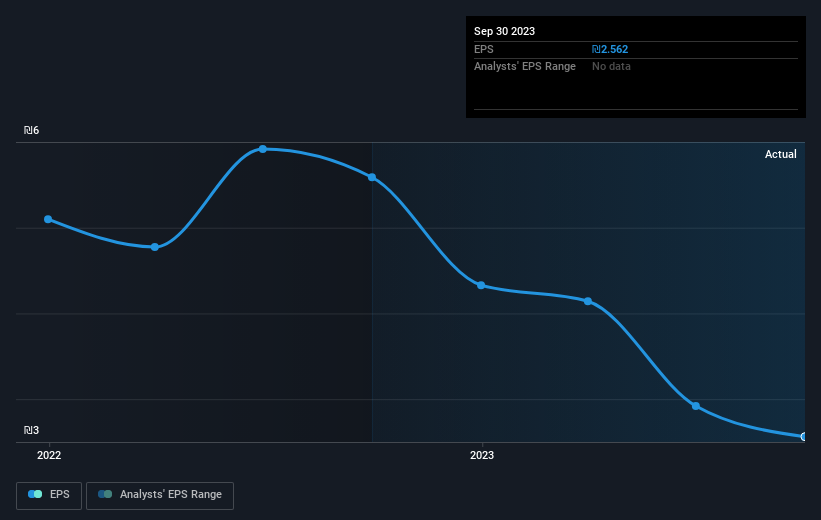Stock Analysis
- Israel
- /
- Real Estate
- /
- TASE:GVYM
The total return for Gav-Yam Lands (TLV:GVYM) investors has risen faster than earnings growth over the last five years

When we invest, we're generally looking for stocks that outperform the market average. And the truth is, you can make significant gains if you buy good quality businesses at the right price. To wit, the Gav-Yam Lands share price has climbed 80% in five years, easily topping the market return of 34% (ignoring dividends). On the other hand, the more recent gains haven't been so impressive, with shareholders gaining just 6.6% , including dividends .
Since the long term performance has been good but there's been a recent pullback of 3.4%, let's check if the fundamentals match the share price.
Check out our latest analysis for Gav-Yam Lands
To paraphrase Benjamin Graham: Over the short term the market is a voting machine, but over the long term it's a weighing machine. One flawed but reasonable way to assess how sentiment around a company has changed is to compare the earnings per share (EPS) with the share price.
Over half a decade, Gav-Yam Lands managed to grow its earnings per share at 15% a year. So the EPS growth rate is rather close to the annualized share price gain of 13% per year. Therefore one could conclude that sentiment towards the shares hasn't morphed very much. Indeed, it would appear the share price is reacting to the EPS.
The company's earnings per share (over time) is depicted in the image below (click to see the exact numbers).

Before buying or selling a stock, we always recommend a close examination of historic growth trends, available here.
What About Dividends?
When looking at investment returns, it is important to consider the difference between total shareholder return (TSR) and share price return. The TSR incorporates the value of any spin-offs or discounted capital raisings, along with any dividends, based on the assumption that the dividends are reinvested. It's fair to say that the TSR gives a more complete picture for stocks that pay a dividend. We note that for Gav-Yam Lands the TSR over the last 5 years was 133%, which is better than the share price return mentioned above. The dividends paid by the company have thusly boosted the total shareholder return.
A Different Perspective
It's nice to see that Gav-Yam Lands shareholders have received a total shareholder return of 6.6% over the last year. Of course, that includes the dividend. However, that falls short of the 18% TSR per annum it has made for shareholders, each year, over five years. The pessimistic view would be that be that the stock has its best days behind it, but on the other hand the price might simply be moderating while the business itself continues to execute. It's always interesting to track share price performance over the longer term. But to understand Gav-Yam Lands better, we need to consider many other factors. For example, we've discovered 4 warning signs for Gav-Yam Lands (1 is significant!) that you should be aware of before investing here.
If you like to buy stocks alongside management, then you might just love this free list of companies. (Hint: insiders have been buying them).
Please note, the market returns quoted in this article reflect the market weighted average returns of stocks that currently trade on Israeli exchanges.
Valuation is complex, but we're helping make it simple.
Find out whether Gav-Yam Lands is potentially over or undervalued by checking out our comprehensive analysis, which includes fair value estimates, risks and warnings, dividends, insider transactions and financial health.
View the Free AnalysisHave feedback on this article? Concerned about the content? Get in touch with us directly. Alternatively, email editorial-team (at) simplywallst.com.
This article by Simply Wall St is general in nature. We provide commentary based on historical data and analyst forecasts only using an unbiased methodology and our articles are not intended to be financial advice. It does not constitute a recommendation to buy or sell any stock, and does not take account of your objectives, or your financial situation. We aim to bring you long-term focused analysis driven by fundamental data. Note that our analysis may not factor in the latest price-sensitive company announcements or qualitative material. Simply Wall St has no position in any stocks mentioned.
About TASE:GVYM
Gav-Yam Lands
Gav-Yam Lands Corp. Ltd, together with its subsidiaries, operates as a real estate company in Israel.
Average dividend payer and slightly overvalued.

